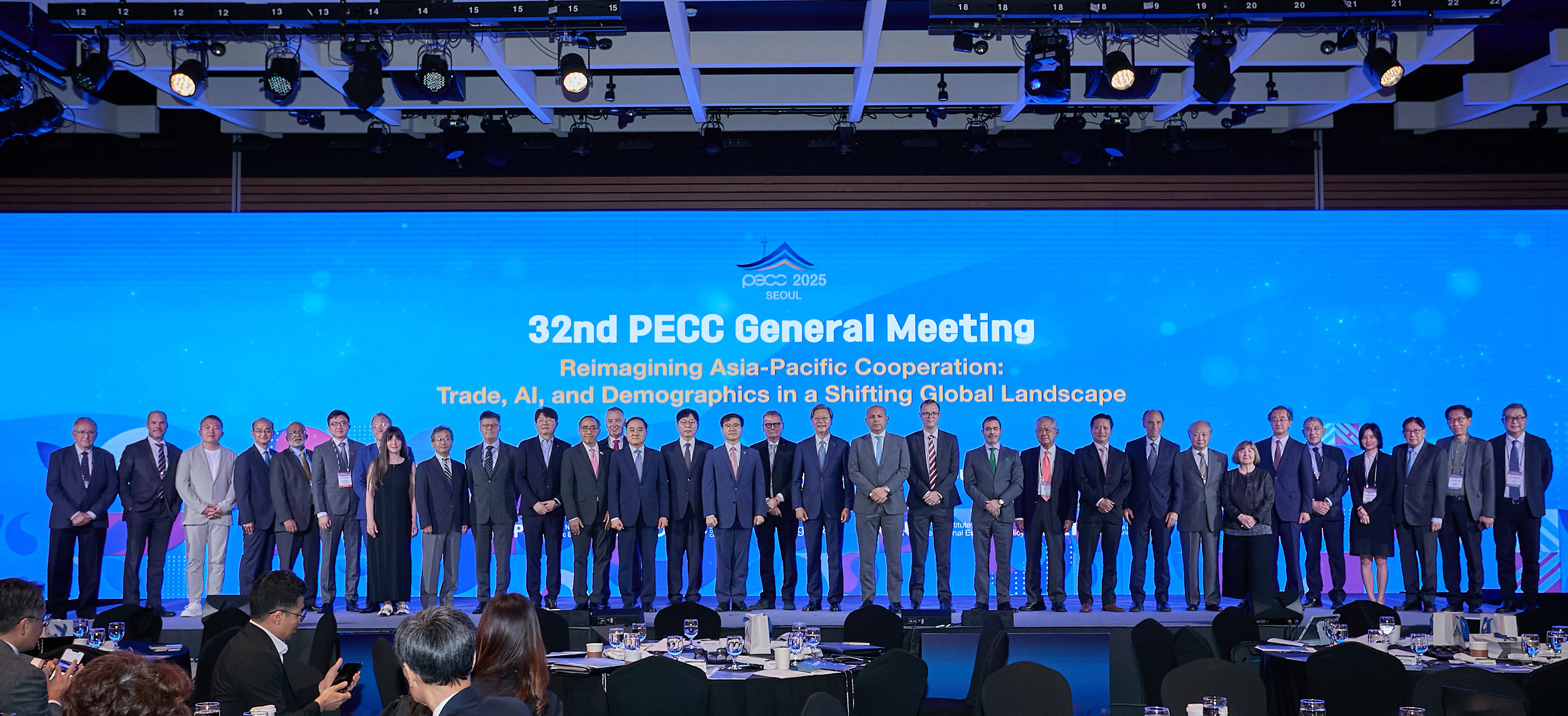
Roleplayers for the 32nd PECC General Meeting - Group Photo
(Photo Credits: KOPEC/KIEP)
The 32nd PECC General Meeting, co-hosted by the Korea Institute for International Economic Policy (KIEP) and the Federation of Korean Industries (FKI), was held on August 12, 2025. The meeting, themed “Reimagining Asia-Pacific Cooperation: Trade, AI, and Demographics in a Shifting Global Landscape”, provided valuable insights and fostered discussions on a range of economic, social, and policy challenges.
The conference commenced with Opening Remarks from Dr. Siwook Lee, Co-Chair, KOPEC and President of KIEP. He emphasized PECC’s long history of bringing together government, business, and academic sectors to foster regional economic cooperation. He also noted that PECC is APEC’s sole non-governmental official observer and a crucial regional think tank. Welcome Remarks were provided by Prime Minister Minseok Kim of the Republic of Korea, and Ambassador Chang-beom Kim, Executive Vice Chairman of FKI. They praised PECC for its ability to foster multi-stakeholder dialogues and offer creative solutions to global challenges ranging from trade tensions to new technologies. Ambassador Kim Chang-beom also announced the launch of the KOPEC Youth Ambassador Program aimed at empowering young leaders.
In his Congratulatory Remarks, Dr. Richard Cantor, Co-Chair of PECC, and Vice Chairman of Moody’s Ratings outlined the PECC member committees’ initiatives supporting Korea’s 2025 APEC priorities which are Connect, Innovate, and Prosper. The work includes developing policy toolkits for economic integration including updates to the CPTPP E-Commerce Chapter, participating in the Paris AI Action Summit and a conference in Singapore to advance discussions on AI governance, and focusing on structural reform to address challenges caused by demographic changes. He highlighted that PECC’s value stems from its work and ability to translate ideas into practical policy actions.
A special session by Professor James Robinson examined anti-trade sentiment in the US partly driven by the unequal distribution of benefits from globalization and a backlash against a new liberal elite. The session explored ways to move forward, including designing a new institutional framework that is better aligned with the current US domestic political economy and creating a system that can function without US participation.
Session 1 centered on the current global trade landscape, noting that widespread protectionism and economic nationalism are becoming the new normal. Panelists examined the long-term effects of tariffs, including those underpinned by geopolitical objectives. APEC and PECC could help by promoting transparency in government policies and private sector actions, as well as building resilience. Also, arrangements such as the WTO’s MPIA and FTAAP as well as a bottom-up approach exemplified by paperless trade initiatives could offer ways to address the global trade challenges.
Session 2 explored how AI and advanced technologies are reshaping the digital future in terms of benefits and risks. Responsible innovation requires risk minimization, especially regarding misinformation, hate speech, and malicious use. Panelists stressed the need for cooperation to ensure equitable access to AI and address data privacy issues within the creative economy, and the importance of interoperability as an essential factor driving the collaboration. The discussion highlighted the private sector’s need for regulatory clarity and a consistent framework rather than a patchwork of rules. The session also touched on the difficulty in distinguishing whether AI would complement or replace human labor, rendering the need for more effective measurement to understand its impact on industries, jobs, and societies.
Session 3 focused on the long-term implications of demographic changes for the region’s sustainability and prosperity. Panelists explored the intrinsic relationship between population structure and economic advancement. It was observed that some economies have completed their demographic transition in a short period, hence they were “growing old before getting rich”. Such experience served as a powerful cautionary tale for middle-income economies currently navigating similar shifts. The session noted that demographics are among the core factors for shaping economic and social policies and some concepts such as retirement age need to be updated for more effective policymaking. To address the challenges presented by these demographic shifts, panelists stressed the critical need for structural reform in several key areas including childcare and retirement systems.
Session 4 probed into the future of Asia-Pacific cooperation, highlighting that the region has reached an inflection point. It was noted that economic politics rather than political economy has increasingly altered the dynamics among APEC economies in recent years. While having an ability to liberalize trade, bilateral arrangements risk circumventing the multilateral trading system and missing opportunities for deepening regional cooperation. To address potential challenges brought by these trends, panelists emphasized the vital roles played by APEC and PECC. APEC’s principles of non-binding and consensus-building were seen as practical tools for future regional cooperation. As an independent “Track 2” platform, PECC complements APEC. In other words, PECC’s tripartite network of government, business, and academic leaders allows it to deliver evidence-based research insights, foster inclusive multi-stakeholder dialogues, and provide forward-looking and actionable solutions to APEC Leaders on various emerging issues ranging from AI to aging workforce.
The conference concluded with closing remarks from Ambassador Zhan Yongxin, Co-Chair of PECC. He highlighted Korea’s past contributions to APEC, including the Seoul Declaration and the Busan Roadmap, which have paved the way for the Putrajaya Vision 2040. Ambassador Zhan also commended PECC for its role as an incubator of new ideas and its commitment to fostering a more open, dynamic, and resilient Asia-Pacific community, especially during this time of uncertainty.
(Click here for program and presentations)

